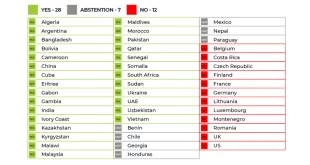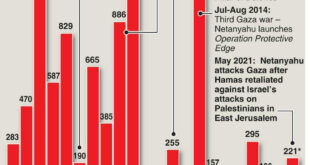 Washington reportedly sends Tehran indirect message saying it will not back Israeli strike on nuclear facilities as long as Iran refrains from attacking American facilities in Persian Gulf
Washington reportedly sends Tehran indirect message saying it will not back Israeli strike on nuclear facilities as long as Iran refrains from attacking American facilities in Persian Gulf
The United States has indirectly informed Iran, via two European nations, that it would not back an Israeli strike against the country's nuclear facilities, as long as Tehran refrains from attacking American interests in the Persian Gulf, Yedioth Ahronoth reported Monday.
According to the report, Washington used covert back-channels in Europe to clarify that the US does not intend to back Israel in a strike that may spark a regional conflict.
In return, Washington reportedly expects Iran to steer clear of strategic American assets in the Persian Gulf, such as military bases and aircraft carriers.
Israeli officials reported an unprecedented low in the two nations' defense ties, which stems from the Obama administration's desire to warn Israel against mounting an uncoordinated attack on Iran.
The New York Times reported Monday that US President Barack Obama is promoting a series of steps meant to curb an Israeli offensive against Iran, while forcing the Islamic Republic to take the nuclear negotiations more seriously.
One of the steps considered is "an official declaration by Obama about what might bring about American military action, as well as covert activities that have been previously considered and rejected," the report said.
Several of Obama's top advisors believe that Jerusalem is seeking an unequivocal American statement regarding a US strike on Iran – should it actively pursue a nuclear bomb.
Israel hopes such a statement is made during Obama's address before the UN General Assembly on September 25.
Others in the White House said Israel is trying to drag the US into an unnecessary conflict in the Gulf.
White House spokesman Jay Carney said Monday that "There is absolutely no daylight between the United States and Israel when it comes to preventing Iran from getting a nuclear weapon."
Carney said that all options remain on the table for Iran. He said the "window for diplomacy remains open," adding that the diplomatic process remains the best way to deal with the Islamic Republic, though "that window will not remain open indefinitely."
Cyber war a go?
According to the New York Times, Washington has also sent Iran a back-channel deal suggesting they curb their nuclear ambitions, but Tehran rejected the deal, saying no agreement is possible sans lifting all West-imposed sanctions.
According to the report, the Obama administration is exploring the possibility of mounting a covert operation, as well as waging a "quiet" cyber war against Iran.
President Obama had previously rejected the notion, fearing such cyber assaults would wreak havoc on Iranian civilian life.
Later in September, the United States and more than 25 other nations will hold the largest-ever minesweeping exercise in the Persian Gulf, in what military officials say is a demonstration of unity and a defensive step to prevent Iran from attempting to block oil exports through the Strait of Hormuz.
In fact, the United States and Iran have each announced what amounted to dueling defensive exercises to be conducted this fall, each intended to dissuade the other from attack.
Copyright © Yedioth Internet. All rights reserved.
Obama Denies Israeli Newspaper Report of Secret Iran Contacts
By Reuters
September 03, 2012 — The White House on Monday denied an Israeli newspaper report that accused Washington of secretly negotiating with Tehran to keep the United States out of a future Israel-Iran war.
The Jewish state also played down the front-page report in its biggest-selling daily, Yedioth Ahronoth, which followed unusually public disagreement between the allies about how to tackle Iran's controversial nuclear program.
"It's incorrect, completely incorrect," White House spokesman Jay Carney told Reuters while accompanying President Barack Obama on a campaign trip in Ohio. "The report is false and we don't talk about hypotheticals."
Without naming its sources, Yedioth said Washington had approached Tehran through two unidentified European countries to convey the message that the United States would not be dragged into fighting if Israel carried out threats to attack Iran.
Yedioth said the United States told Iran it should in return refrain from retaliating against U.S. interests, including its military in the Gulf.
In Jerusalem, an Israeli official, who asked not to be identified, described the report as illogical.
"It doesn't make sense," the official said. "There would be no need to make such a promise to the Iranians because they realize the last thing they need is to attack U.S. targets and draw massive U.S. bombing raids."
In appearances on Sunday and Monday, Israeli Prime Minister Benjamin Netanyahu urged world powers to set a "clear red line" for Tehran's atomic program that would convince Iran they were determined to prevent it from obtaining nuclear arms. Such remarks have been portrayed in Israel as criticism of Obama.
Obama, who seeks re-election in November, is fighting accusations from his Republican challenger, Mitt Romney, that he is lax in support for Israel.
The Obama administration says it is strongly committed to Israel's security and to preventing Iran from obtaining a nuclear weapon. Iran says its nuclear program is entirely peaceful and has vowed far-ranging reprisals if attacked.
The United States and Israel both accuse Iran of secretly seeking the means to make nuclear arms and say they reserve the right to take military action to prevent Iran from getting them.
MESSAGES
However, the Obama administration has repeatedly made clear in public that it thinks diplomacy and tough new sanctions have not yet run their course, even as Israeli officials say the window for effective military action is rapidly closing.
Israeli Deputy Prime Minister Dan Meridor said he still believed Obama's assurances that Washington was prepared to use force if needed to prevent Iran from developing a bomb.
"I don't know what kind of messages Yedioth Ahronoth heard," Meridor said. "But I think the Iranians understand … that if they cross a line towards a bomb, they could encounter very strong resistance, including all the options that are on the table – as the American president has said."
Obama has had frosty relations with the right-wing Netanyahu, who is due to visit the United States this month.
The Nov. 6 presidential election is seen hinging mostly on the U.S. economy with foreign policy taking a back seat. But support for Israel is an important issue for many U.S. voters, including evangelical Christians as well as Jews who could prove critical in battleground states like Florida and Pennsylvania.
Obama wants to shore up his advantage among Jewish voters. He received 78 percent of the Jewish vote in the 2008 election, but a nationwide Gallup poll in June showed him down to 64 percent backing versus Romney's 29 percent.
Administration officials have also made clear they regard the prospect of an Israeli attack on Iran with alarm.
General Martin Dempsey, chairman of the Joint Chiefs of Staff, was quoted in Britain's Guardian newspaper as saying of a prospective Israeli attack on Iran: "I don't want to be complicit if they choose to do it."
The Obama administration and the European Union imposed harsh new sanctions on Iran in July. U.S. officials say they hope that this will persuade Iran to curb its nuclear projects.
Of Dempsey's comments, Meridor said: "I'm sorry we've reached the situation where Dempsey said what he said, but this campaign (against Iran) is continuing and it must be conducted very wisely."
Netanyahu's cabinet is divided over the wisdom of attacking Iran, and Israeli officials have dropped heavy hints of a retreat on their strategy, under which Netanyahu would shelve threats of an attack now in return for a stronger public pledge from Obama on conditions that would provoke U.S. action in the future.
"The greater the resolve and the clearer the red line, the less likely we'll have conflict," Netanyahu said on Monday. (Writing by Matt Spetalnick in Washington and Jeffrey Heller in Jerusalem; Editing by Eric Beech)
© 2012 Thomson/Reuters. All rights reserved.
 Sri lanka Muslims Web Portal Diversity and Inclusiveness
Sri lanka Muslims Web Portal Diversity and Inclusiveness



